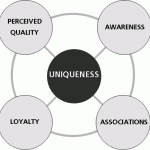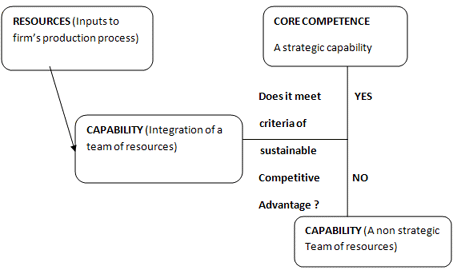 No matter what industry your business operates in, you’re almost guaranteed to have competition. The lower the barrier for entry into a certain industry, the more competetive it’s likely to be. The widespread use of technology has lowered the cost of doing business, and in some cases businesses can be started with little more than the shirt on your back.
No matter what industry your business operates in, you’re almost guaranteed to have competition. The lower the barrier for entry into a certain industry, the more competetive it’s likely to be. The widespread use of technology has lowered the cost of doing business, and in some cases businesses can be started with little more than the shirt on your back.
Let’s say that you decide to start a web design business. I can hire you to do work for me, but there are thousands of other designers that are capable of producing the same work; some will likely cost more, but some will be cheaper. Why should I choose you? What can you do that the other guy cannot? If your whole sale is “We make the best designs for the lowest price, and offer the best service”, you’re just making claims that every single competitor has already made. I have already moved on to someone else.
The best way to get my particular business is to appeal to my needs. Let’s say that I expect a large portion of my users to be accessing the website from a mobile device, I am going to look for a designer that “specializes in responsive design and mobile user experience”. Of course you can’t just make those claims, you need the relevant experience and portfolio to back it up. If you’ve put in the effort to learn about mobile technologies or adapted your hiring process to favor employees with the relevant experience, your company can list responsive mobile design as a specialty, and likely get my business over another designer that doesn’t have the same level of competency.
Core competencies do four things:
- They’re not easily replicated by competitors
- They make positive contributions to the final product or end user experience
- They do not come at the expense of standard competencies
- They can be applied time and time again to a number of clients
Core competencies are the basis for your added value as an organization. It doesn’t have to be a specialty or technical knowledge, but can also involve customer service, close working relationships with suppliers, extended distribution networks, focused customer base, international business, or any other advantage that your company provides over your competitors.
Ahead of the Curve
In the late 1990s, most computer manufacturers offered a limited range of models, most were developed with a broad user base in mind. Users were starting to buy computers for specialized use; my mother only ran Microsoft Word, Internet Explorer and accounting software, but I had dozens of programs and games that required more power and a machine that could handle hig frame rates. Mom also needed a CD burner that didn’t come with the basic models, but that single feature didn’t justify spending an extra $1,000 to buy the upgraded gaming system.
Dell computers saw a need for full customization, and recognized that their efficient production models (a core competency that was originally incubated to lower costs) gave them the unique ability to build a computer quickly, after receiving an order. Their components were almost entirely outsourced, so building a bespoke machine was almost as simple as packing individual components in a shipping box.
Other manufacturers soon caught up to Dell when it came to customization, but Dell exploited a unique core competency right at the time that users needed it the most. For some manufacturers, offering a similar level of customization meant re-tooling a large section of their facility, hiring a large number of specially skilled builders, updating accounting software to handle custom orders and making several other changes to their organization to even begin handling custom orders, let alone doing it well.
Meet the Needs of the Future
The whole idea is to offer something that your competitors can’t offer. Business leadership should focus on developing an independent and plausible outline of tomorrow’s opportunities, and build capabilities that can exploit them today. When you take luck out of the equation, the odds of your company offering exactly what everyone needs at a time when no one else has the capability increase, and that is how a good business turns into a runaway success.

A map that illustrates the difference between core competencies and capabilities.
If you don’t have the resources to proactively develop competence in the areas that you think represent a high future demand, look internally to the core competencies that your company already offers. Use those unique aspects in your marketing, in place of generic competencies or aspects that aren’t attributed directly to your organization.
The Business – Story Loop
When it comes to social media marketing, you’ll often hear that you should “tell your brand story”, or form relationships by sharing relatable content. That’s great when your goal is to have a conversation, but you wouldn’t be putting in the time and effort if social media couldn’t help your business.
Your core competencies are the easiest way to tie your brand story back into business, without sounding like a pitch. These are the traits that make you unique, and make your business valuable. Every business has a story behind their evolution into a success. The key to online branding is isolating the part of that story that tells a narrative and also exhibits your core competencies. Take McDonalds for example. Two of their primary advantages are efficiency and customer service. Which of these short statements tell a narrative while also stressing key concepts of their approach to consumer facing business?
“McDonalds uses industry standard equipment to fix food quickly and keep it warm so we can turn out customers in less than a minute. This efficiency maximizes our profits and the speed is a major selling point for visiting the McDonalds drive through instead of Burger King.”
or
“The McDonald brothers stressed customer service since they opened the first store in San Bernadino California. If the customers weren’t satisfied, how could they be satisfied? With that maxim in mind, McDonalds opened Hamburger University, a 130,000 square ft training facility in Oak Brook Illinois to offer advanced restaurant management education to employees. Our training mission is to be the best talent developer of people with the most committed individuals to Quality, Service, Cleanliness and Value in the world.”
What makes your business unique? When you answer that question, does it sound like the About Us page boilerplate that is rampant online? Or is it a description of a business that offers advantages to their customers that their competitors cannot even claim to offer? If you don’t have distinct core competencies, think about where your industry is headed and institute a strategy that will make your business especially qualified to meet future needs once the future gets here. We know you’re doing business, but we want to know why you should be the one to do our business.
Do you consider your core competencies in your marketing? Tell us about it in the comments below.
- The Evolution of Marketing: From Catalogs to Cat Blogs - November 8, 2022
- How to Make a Tweet This Link - February 5, 2022
- Dramatically Improve Marketing Results with Advanced Analytics - September 20, 2021
- The Next Chapter for Social Media Sun - June 4, 2013
- Optimizing Your FAQ to Maximize ROI - December 5, 2012
- Blogging Isn’t a Rocket, It’s More Like a Roller Coaster - November 19, 2012
- Weapons of Influence and Klout’s Role in Marketing - November 17, 2012
- The Biggest Problem With Inbound Marketing Blogs Today - November 16, 2012
